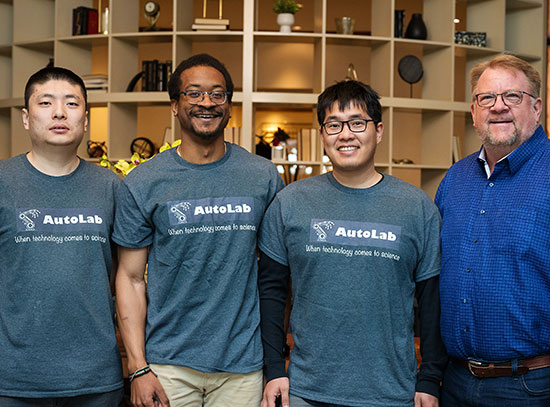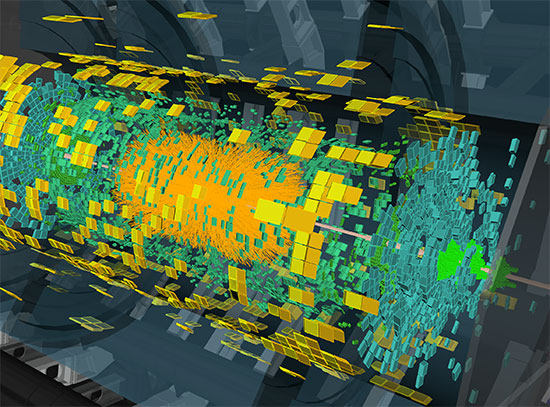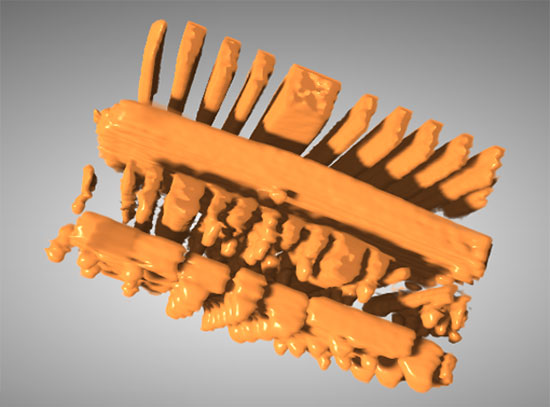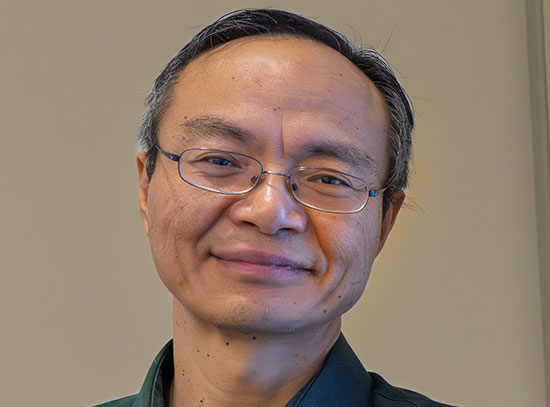So Long, Summer Students
Luminaries from Brookhaven and beyond say farewell to the Lab's summer interns
August 14, 2015
On August 6, 2015, more than 200 college-age science students marked the end of 10 weeks living and learning among the researchers at the U.S. Department of Energy’s (DOE) Brookhaven National Laboratory. The daylong closing ceremonies for this summer’s internship programs featured remarks from a host of luminaries, while the students themselves had the opportunity to give oral presentations and share posters highlighting their scientific pursuits over the past several weeks.
Brookhaven’s Office of Educational Programs offers learning opportunities to young researchers from across the country as part of the DOE Office of Science’s national internship programs, including its Visiting Faculty Program, Science Undergraduate Laboratory Internships (SULI), Community College Internships (CCI). Interns also come to the Laboratory to participate in the Graduate Research Internship Program (GRIP) and other opportunities supported by Brookhaven Lab mentors through their research programs.
In all cases, the participants get unique opportunities to conduct research alongside prestigious scientists at Brookhaven, including many working at DOE Office of Science User Facilities such as the Relativistic Heavy Ion Collider (RHIC), the National Synchrotron Light Source II (NSLS-II), and the Center for Functional Nanomaterials (CFN).
For the closing ceremonies, the interns assembled in the auditorium of Berkner Hall for speeches and accolades, including keynote remarks from the Honorable LaDoris G. Harris, DOE Director for the Office of Economic Impact and Diversity, and Rev. Dr. Calvin O. Butts, III, President of the State University of New York at Old Westbury, Long Island.
Harris said that developing this next generation of promising young researchers represents a vital national need, and she noted how pleased she was that so many young women—“the most underutilized resource in the world,” as she put it—were represented here in a traditionally male-dominated field. She closed by offering advice to tomorrow’s scientists.
“My word to you is go out and be excellent at what you do,” she said. “Make excellence your brand, because that is what you are. You need to fully embrace that, and we here at the Department of Energy, at Brookhaven, and at the other federal agencies that you will hopefully be interested in potentially working with can help you along the way.”
In introducing Harris, OEP Manager Kenneth White drew a parallel between Harris’ own formative experiences as a scientist and what the interns had gained from their summer at Brookhaven. He argued this learning experience would provide a vital foundation to carry them through wherever their research took them, be it in business, in the pure sciences, or elsewhere.
“I know many of you when you first got here may have been somewhat intimidated. I mean, after all, we have seven Nobel Prizes, right? It’s a real credit to our research. So you’re in a place that’s really amazing, and it may be something very different from what you had at university. Ideally, you were not treated as a student, you were treated as a colleague and a coworker and co-researcher—a collaborator in some really extraordinary work.”
Later in the day, Butts reflected on just what it meant to spend time at Brookhaven, both for interns and for himself. He praised the interns for their dedication to scientific research, which he credited with opening up new fields of understanding and creating thousands of American jobs.
“You were sitting behind a microscope while your buddy was on a beach!” Butts noted to appreciative laughs from the audience. “And the only relaxation that you have is you could play a guitar in the talent show. But most of your time was spent applying the seat of your pants to a chair, bent over a microscope, or bent over a grid, or bent over something that was helping to make this nation truly exceptional.”
Butts noted that he had seen so many young men and women at the poster sessions who had displayed not just their knowledge of science but also their belief in themselves and their ability to find answers even when experiments and research did not go according to plan. This, he said, was about training one’s mind to be inquisitive and curious, areas in which the Lab, he said, has much to offer.
“How essential it is to live in a mind with interesting and amazing pictures on the wall,” he noted. “And now, as a result of having been here at Brookhaven, I have some more pictures to look at as I walk around the living room of my mind.”
Lee Zeldin, the U.S. Representative for Brookhaven’s congressional district, detailed how he had grown up playing sports on the Lab’s grounds, fostering a lifelong connection with the facility that he carries over into his political career. He talked about the incredible potential he saw in the students assembled before him.
“The Lab first opened in 1947, and since then there’s just been remarkable accomplishments that have happened here,” observed Zeldin. “I look around this room hoping that, as we think about what’s ahead, that in the next 70 or 80 years… that some of you will leave a mark. Maybe a few of you will win that Nobel Prize for doing something great, and maybe it’s done here.”
Earlier in the ceremonies, Robert Tribble, Brookhaven’s Deputy Director for Science and Technology, opened the event by polling the students on their summer experience:
“One question I want to ask is how many of you completed what you thought you would complete when you arrived?” While a decent number of the students raised their hands, many more hands shot up in response to a later question: How many of the students had changed course in their projects as they learned through their research at the Lab?
“Welcome to the world of research!” Tribble observed in response to all the hands being raised. “That’s what it’s all about. You jump into a project, you think you know what you’re going to do, you find out something, you change direction, and you then explore a new direction because you’ve learned something that you didn’t know, or no one else knew, about what you were trying to accomplish. It’s a lot of fun to get up each day and to think about going to work and doing something you really enjoy. And that’s often what you find when you’re a researcher.”
Noel Blackburn, Brookhaven’s Manager of University Relations and DOE Programs, reflected on how the past 10 weeks may have changed the program participants.
“I remember vividly saying to you all 10 weeks will fly,” Blackburn recalled. “Did it fly?” A chorus of yeses filled the auditorium. “On the first day, I said to you all that I would like you to leave the way you came,” continued Blackburn, as he restated the importance of safety at Brookhaven. But with a twist, he added, “Are you all leaving the way you came? I hope you say ‘no,’ because I hope, intellectually, you’re stimulated.”
Frank Crescenzo, the Brookhaven site manager for the Department of Energy, offered some big-picture advice for the young scientists, challenging them to take their science out of the Lab and into the wider world. This meant not just learning science, but learning the business of science, and working toward bringing innovative ideas conceived in the laboratory to the marketplace.
“Secondly, as you learn your science, learn to communicate,” he continued. “It’s critical to your proposals, working with your colleagues, and conveying your findings, especially to those outside your technical sphere.”
The Student Perspective
The students got an opportunity to practice their communication skills with their oral presentations and poster sessions, which showcased the remarkable breadth of scientific research they had engaged with during their time at Brookhaven—from materials science and particle physics to biology and climate modeling. During the session, the interns reflected on how the Brookhaven environment had shaped their experience.
“Everyone here is very down-to-earth and willing to meet with you and bounce ideas off of you,” said SULI participant Kimberly Okoli, a student at Cornell University and a Long Island resident. “The networking is amazing because everybody here is somebody! They’re all so helpful, and all the adults are so encouraging of the students in our research. They’re so willing to do whatever it is that we need to help get our ideas going. It’s an amazing, humbling, yet really comfortable environment.”
Christine Hirt, also a SULI participant, a student at the City University of New York (CUNY) Hunter College, agreed: “The Lab in general is just a really, really interesting place in that there’s so much going on at one time. Being around people who all kind of think and care about science in the same way as you, we all know that we’re going to learn a lot,” she said. “It’s pretty cool to be asked to share our fresh perspective with scientists who have perhaps been doing this for many years. It’s kind of like a big science summer camp for adults, which is really fun!”
Many interns noted the particular advantages offered by Brookhaven’s multidisciplinary atmosphere. SULI participant Victor Gofron is a student at the University of Illinois at Urbana-Champaign who just finished up his second summer internship at the Lab, and he met his current mentor, John Smedley of the Instrumentation Division, at a Lab event while he was previously interning at NSLS-II.
“I met him actually at a Lab event where they give out free pizza for the students,” Gofron recalled. “We talked about some of the science, and I’m a materials science engineer, and he works primarily with materials science stuff. We realized we wanted to collaborate, so I came here this year.”
Hirt said the Lab had helped her look beyond her relatively narrow focus on climate science and engage with how science works more broadly.
“Coming in, I had not much experience with computer coding or anything like that,” Hirt explained, “so I learned a lot on my project doing the actual coding and learning about science in general. Knowing how to go about answering science questions is really important too. How to formulate a scientific question and then answer it.”
Meanwhile, Okoli is hopeful that she will be able to maintain the connections she has made at Brookhaven even after returning to school.
“Even if I might not come back here again, my mentor has interest in adding me as a co-author in our research and helping me continue my research long distance,” she said. “It doesn’t feel like a book is closing. It just feels like I’m turning a page. It’s all just going to keep going.”
Brookhaven National Laboratory is supported by the Office of Science of the U.S. Department of Energy. The Office of Science is the single largest supporter of basic research in the physical sciences in the United States, and is working to address some of the most pressing challenges of our time. For more information, please visit science.energy.gov.
2015-5864 | INT/EXT | Newsroom









